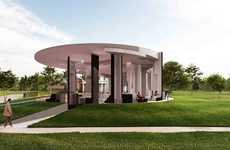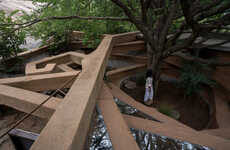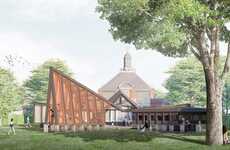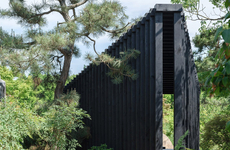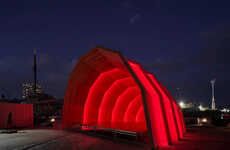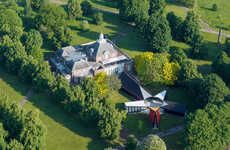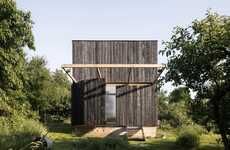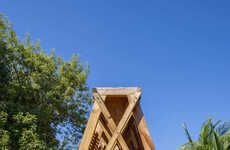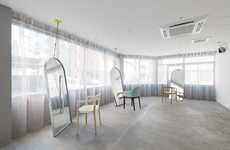
Smiljan Radic's Serpentine Pavilion Resembles the Slithering Reptile
Jana Pijak — July 2, 2014 — Art & Design
References: serpentinegalleries.org & frameweb
The Serpentine Pavilion by Smiljan Radic is designed as part of The Serpentine Gallery. Located in London's Kensigton Gardens, the temporary pavilion is built to resemble the slithering form of the dangerous jungle reptile.
The tunnel-like structure "combines a well-mannered brand of minimalism with primeval, naturalistic references and is comprised of standing stones that are set within an undulating landscape." Described as a subtle homage to Britain's famed prehistoric monument, the Stonehenge, this curvilinear structure is conceptual and experiential for its visitors.
Taking inspiration from ancient ruins, the Serpentine Pavilion by Smiljan Radic allows its visitors to walk inside its tunnelled interior. Resembling the inner-workings of a snake predator, this conceptual structure holds the true title of a sensory space and is a monumental addition to its surrounding, natural topography.
The tunnel-like structure "combines a well-mannered brand of minimalism with primeval, naturalistic references and is comprised of standing stones that are set within an undulating landscape." Described as a subtle homage to Britain's famed prehistoric monument, the Stonehenge, this curvilinear structure is conceptual and experiential for its visitors.
Taking inspiration from ancient ruins, the Serpentine Pavilion by Smiljan Radic allows its visitors to walk inside its tunnelled interior. Resembling the inner-workings of a snake predator, this conceptual structure holds the true title of a sensory space and is a monumental addition to its surrounding, natural topography.
Trend Themes
1. Minimalist Architecture - Disruptive innovation opportunities include designing sleek and functional buildings with a focus on simplicity and clean lines.
2. Conceptual Structures - Opportunities arise to create immersive and experiential spaces that evoke emotions and challenge traditional architectural norms.
3. Naturalistic Design - There is potential to incorporate elements from nature into architecture, creating harmonious and organic structures that blend with the environment.
Industry Implications
1. Architecture - Architects can explore new design philosophies and techniques to create innovative and visually striking buildings.
2. Tourism - The tourism sector can benefit from unique and captivating architectural landmarks that attract visitors and enhance the overall travel experience.
3. Art and Design - Artists and designers can push boundaries by incorporating unconventional materials and forms into their projects, blurring the line between art and architecture.
2.7
Score
Popularity
Activity
Freshness


